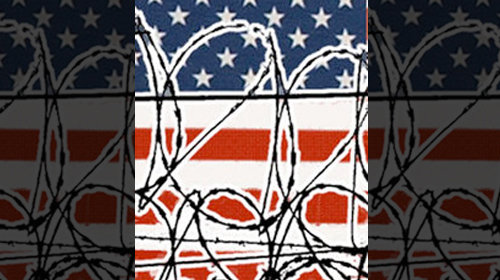Federal court calls FBI to account for the unlawful imprisonment of U.S. citizen Abdullah al-Kidd


Abdullah al-Kidd is a Kansas-born American citizen, a father, and a graduate of the University of Idaho where he was a star football player. And in 2003, he became the victim of the FBI’s misuse of a little-known federal law to imprison him without charges. He was arrested and imprisoned under harsh conditions for more than two weeks—even though the FBI had no probable cause to believe he had done anything wrong. The ACLU represents Mr. al-Kidd in his effort to hold the government accountable for its violation of his rights. Last week, the federal district court in Idaho issued calling the FBI to account for Mr. al-Kidd’s unlawful arrest.
Mr. al-Kidd’s ordeal began after 9/11 when the FBI started investigating Muslims in Idaho—including Mr. al-Kidd, who converted to Islam in college. The FBI spoke with Mr. al-Kidd on multiple occasions, and he always voluntarily cooperated with their requests for interviews. Yet in March 2003, as he was preparing to travel to Saudi Arabia to study abroad on a scholarship, the FBI arrested him without warning. For 16 days, he was imprisoned under extremely harsh conditions. He was held in high-security cells that were kept lit 24 hours a day. He was stripped naked in full view of criminal inmates and guards. He was shackled, humiliated, and subjected to multiple body-cavity inspections. Although he was treated like a dangerous criminal, he was never charged with any wrongdoing. Finally, the court released him from jail on the condition that he relinquish his passport, live with his in-laws, and limit his travel to four states. Mr. al-Kidd lived under these conditions for more than a year. During this time, he lost his scholarship, had difficulty finding work and saw his marriage disintegrate.
How did this happen? Mr. al-Kidd’s imprisonment was the result of the FBI’s misuse of a little-known federal law called the “material witness” statute. This statute allows the government to arrest a witness who is needed to testify in the criminal case against someone else. It is intended only to allow for the brief detention of witnesses who are truly necessary to the trial and who otherwise would not cooperate with a subpoena. In the wake of 9/11, however, the government began abusing this limited power in an alarming new way. As the ACLU and Human Rights Watch found, the government began using the statute to —almost all Muslim men—whom the government viewed with suspicion, but against whom they had no probable cause to justify a traditional arrest. Calling these people“witnesses” was a pretext. In Mr. al-Kidd’s case, the government never even called him to testify at the trial for which he was supposedly needed.
What’s more, in Mr. al-Kidd’s case, the FBI agents misled the court in order to get the arrest warrant they wanted. There was simply no reason to believe Mr. al-Kidd wouldn’t voluntarily show up to testify if asked. On the contrary, he was a U.S. citizen with a wife and child in Idaho and strong community ties, who had previously cooperated with the FBI on every occasion. So instead, the FBI submitted a warrant application riddled with omissions and falsehoods. The FBI did not tell the court that Mr. al-Kidd was an American citizen with family members living in the United States; instead, the application strongly implied that he was a Saudi national leaving the United States for good. Nor did they tell the court about Mr. al-Kidd’s past cooperation with the FBI. The FBI’s warrant application even falsely claimed that Mr. al-Kidd had purchased a one-way ticket to Saudi Arabia—when in fact, he had a round-trip ticket with an unscheduled return date, exactly what you’d expect of a student going to study abroad.
Last week, the court in Idaho—the very same court that granted the FBI’s request for a warrant in 2003—took the FBI to task for this “misleading and highly suggestive” warrant application. Judge Edward J. Lodge, adopting the recommendations of Magistrate Judge Mikel H. Williams, ruled that the FBI agent who sought Mr. al-Kidd’s arrest violated the Fourth Amendment by recklessly misleading the court. Judge Lodge also ruled that the United States was liable for false imprisonment, and that Mr. al-Kidd’s “abuse of process” claim—his claim that the government had misused the material witness statute “for a purpose other than to secure testimony”—deserves a trial.
As national commentators have recognized, It’s the first time that a court has found on the merits that the government violated the constitutional rights of a person wrongfully arrested as a material witness after 9/11. It’s a reaffirmation of the judiciary’s role in preventing unjustified imprisonment. And most importantly, it’s a reminder that the FBI isn’t above the law.
Last year, the Supreme Court decided that former Attorney General John Ashcroft can’t be held liable for directing a policy of using the material witness statute to preventively detain and interrogate people after 9/11. But four out of the eight Justices considering the case (Justice Kagan was recused) agreed that there were serious questions about “whether the Government’s use of the Material Witness Statute in [Mr. al-Kidd’s] case was lawful.” Magistrate Judge Williams and Judge Lodge have now answered this question decisively in Mr. al-Kidd’s favor. As Justice Ginsburg wrote in her concurring opinion in last year’s case against Ashcroft, Mr. al-Kidd’s “ordeal is a grim reminder of the need to install safeguards against disrespect for human dignity, constraints that will control officialdom even in perilous times.” Mr. al-Kidd’s victory last week is an important step towards holding the government accountable for its abuses of power, and preventing them from ever happening again.
Learn more about detention: Sign up for breaking news alerts, , and .

